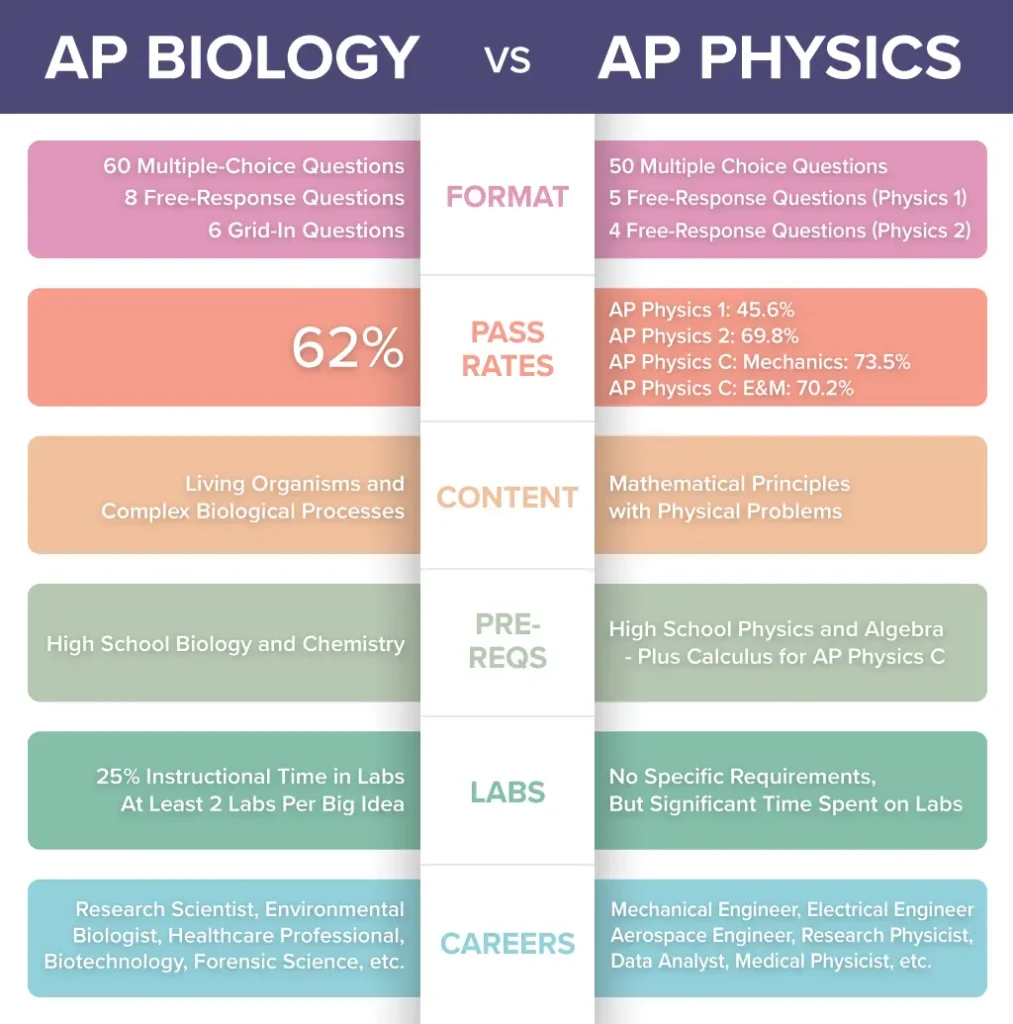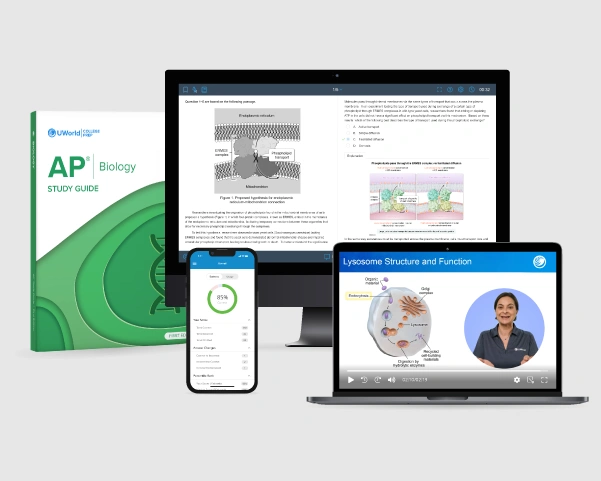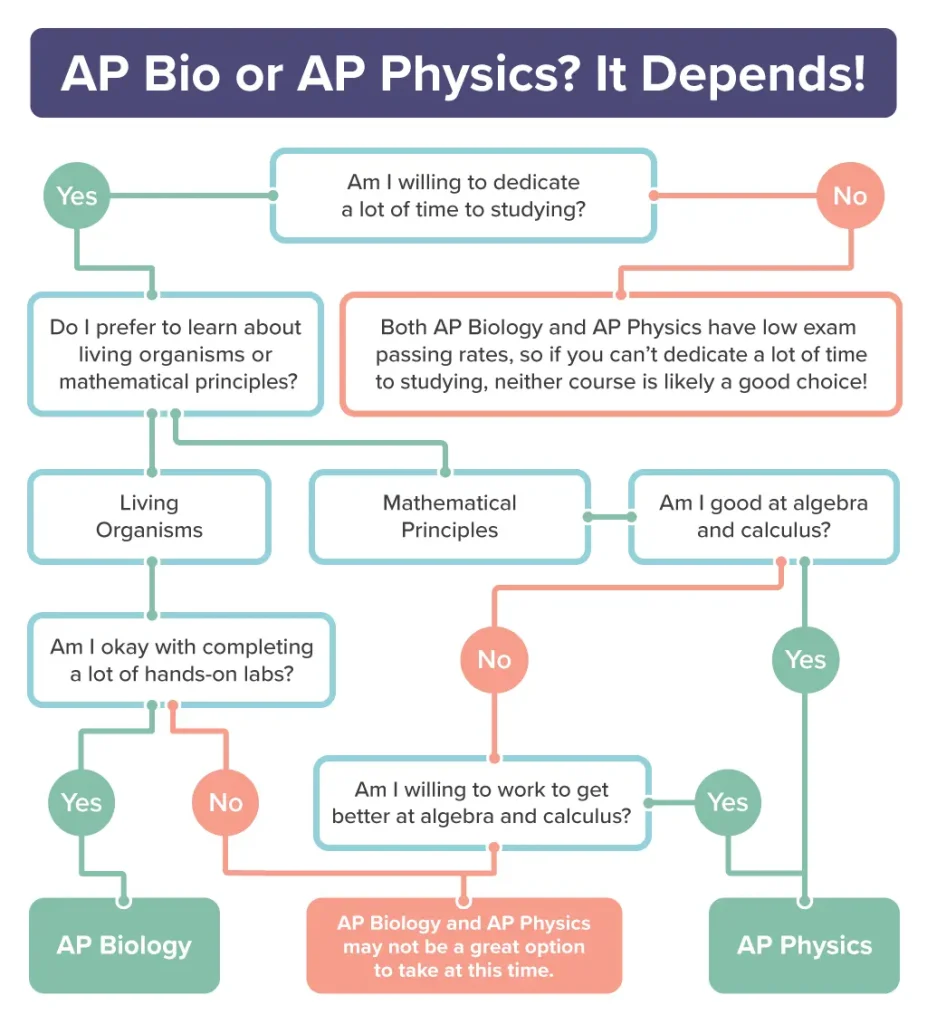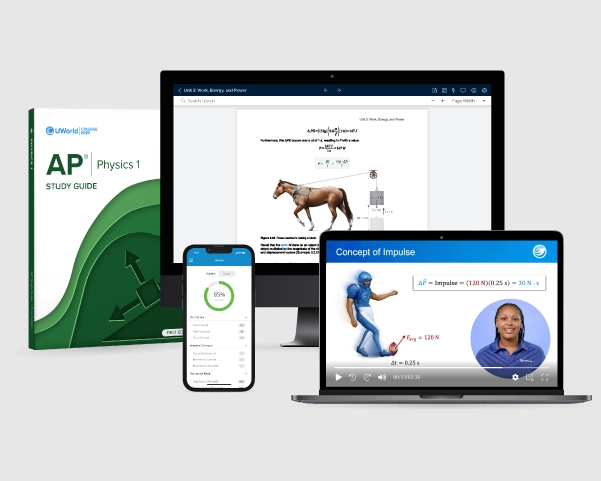How Hard are AP Biology and AP Physics?
Both AP Biology and AP Physics 1 are challenging STEM courses that demand a deep understanding of complex concepts. AP Biology emphasizes memorization, comprehension of intricate biological processes, and data analysis, with 68.3% of students scoring 3 or higher in 2024 and 16.8% achieving a 5. In contrast, AP Physics 1 focuses on problem-solving, mathematical reasoning, and conceptual understanding of physics principles, with a lower success rate—only 47.3% of students scored 3 or higher, and 10.2% earned a 5. These numbers reflect the challenging nature of both subjects compared to many other AP courses, as they require strong analytical and critical-thinking skills to succeed.
How AP Bio and AP Physics Stack Up
AP Biology focuses on living organisms and their processes. It includes cell structure, genetics, evolution, ecology, environmental science, and biotechnology. This course emphasizes scientific inquiry and prepares you for college-level biology.
AP Physics is divided into three courses: Physics 1, Physics 2, and Physics C. Physics 1 covers mechanics, energy, and power; Physics 2 includes fluid mechanics, thermodynamics, and electricity; Physics C involves more advanced topics in mechanics and electricity, requiring calculus. These courses emphasize understanding physical principles through math and problem-solving and prepare you for college-level physics.

Exam Format and Passing Rates
AP Biology: The AP Biology exam has two main sections.
- Section 1: The first has 60 multiple-choice questions and 6 grid-in questions, totaling 90 minutes and accounting for 50% of your exam score.
- Section 2: The second is the free-response section with 8 questions, also 90 minutes, accounting for 50% of your exam score. This section includes 2 long free-response questions and 6 short ones.
While there are no separate lab-based questions for each section, lab-related concepts are integrated throughout the exam. The most current passing rate for AP Biology is 62%, with over 16% of students scoring a 5 and 23% scoring a 4.
AP Physics: The AP Physics exams differ based on the specific course.
- AP Physics 1 includes 50 multiple-choice questions and 5 multi-part free-response questions, lasting a total of 90 minutes.
- AP Physics 2 includes 50 multiple-choice questions and 4 free-response questions, lasting a total of 90 minutes.
- AP Physics C has 2 exams, divided into Mechanics and Electricity and Magnetism. Each section has 35 multiple-choice questions and 3 free-response questions, lasting 45 minutes per section.
All AP Physics exams integrate lab-related concepts into the questions. AP Physics passing rates vary depending on the course: AP Physics 1 currently has a 45.6% passing rate; AP Physics 2 sits at 69.8%; AP Physics C: Mechanics has a passing rate of 73.5%; and AP Physics C: Electricity and Magnetism has a passing rate of 70.2%.

Content Focus and Study Strategies
Students may find the difficulty of AP Bio vs AP Physics varies based on their aptitude for the skillsets required for each course. AP Biology requires you to understand complex biological processes and involves significant memorization. AP Physics demands you apply mathematical principles to physical problems, making it more calculation-intensive. While AP Bio is more conceptual, AP Physics focuses heavily on problem-solving and mathematical derivations.
Preparing for AP Bio vs AP Physics involves recognizing the unique requirements of each course and adjusting your study techniques accordingly. Effective study strategies for AP Bio include creating detailed notes, using flashcards for memorization, and engaging in group study sessions to discuss concepts. For AP Physics, regularly practicing problem-solving, understanding key formulas, and working through past exam questions will help you tackle challenging concepts.
Course Prerequisites
Knowing the prerequisites can help you choose the course best suited to your academic background when considering AP Bio vs. AP Physics. Prerequisites ensure you have the necessary foundational knowledge in science and mathematics to succeed in these advanced courses.
The College Board® recommends taking high school biology and chemistry classes as a prerequisite to the AP Biology exam.
For AP Physics, there are different prerequisites depending on the specific course. AP Physics 1 and 2 require you to complete geometry and Algebra II or an equivalent course. AP Physics C: Mechanics recommends you complete calculus. AP Physics C: Electricity and Magnetism has the most rigorous prerequisites, typically requiring you to complete AP Physics C: Mechanics and Calculus BC or an equivalent course.
Ultimately, understanding these prerequisites will help you make an informed decision about which course aligns best with your current academic strengths and future goals.
Lab Components
When comparing AP Bio vs AP Physics, the role of labs highlights the differences in how each course develops hands-on scientific skills. Labs allow you to design experiments, collect and analyze data, and develop scientific reasoning skills.
AP Biology requires you to spend at least 25% of instructional time in hands-on, inquiry-based laboratory investigations. You must conduct at least 2 labs per big idea in the curriculum, with opportunities to record and present evidence from their investigations. The course provides 13 inquiry-based lab investigations, though your teachers may substitute other labs that cover the required content.
The College Board does not outline specific lab requirements for AP Physics, but it is recommended that a significant portion of instructional time be dedicated to hands-on lab work aligned with the course's big ideas.
Whether you take AP Bio or AP Physics, lab work will be integral to understanding the curriculum, though the structure and emphasis differ, reflecting each course's unique focus.
College Credit and Career Paths
AP Biology and AP Physics can often count toward introductory-level biology and physics courses in college. Many universities accept high AP exam scores — generally a 4 or 5 — to fulfill general education science requirements or as prerequisites for advanced science courses.
AP Biology may count as credit toward courses, including general biology or introductory cell biology classes, while AP Physics may satisfy requirements for general physics or introductory courses in mechanics.
Career paths stemming from AP Biology include becoming a geneticist, microbiologist, ecologist, or biomedical researcher. AP Physics can lead to careers such as a mechanical engineer, astrophysicist, robotics specialist, or materials scientist. Both courses provide a foundation for interdisciplinary fields such as biophysics or medical physics, opening doors to medical careers in imaging, radiation therapy, or biomechanics.
These advanced courses also prepare students for research roles in academia or specific industries.
Should I Take AP Bio or AP Physics?
If you’re still wondering, “Is AP Bio harder than Physics?” This infographic could help you choose the right course.

Choosing the Right AP Course
When deciding whether to take AP Biology or AP Physics, consider your interests, career goals, and academic strengths. AP Biology will suit you if you are fascinated by life sciences and comfortable with memorization, while AP Physics is ideal if you excel in math and enjoy problem-solving.
Both courses require a significant time commitment and involve extensive lab work, but AP Bio has a heavier set of hands-on lab requirements. Before choosing either course, you should assess how much time you can dedicate to studying, as AP Bio and AP Physics have notoriously low exam pass rates.
Taking Both AP Biology and AP Physics
Taking AP Biology and AP Physics simultaneously can be challenging but rewarding if you’re interested in interdisciplinary fields such as biomedical engineering or biophysics. Here are some of the pros and cons of enrolling in both courses:
Pros:
- Strong foundation in both biological and physical sciences:
- Enhanced college applications with diverse skill sets:
- Broader career opportunities in interdisciplinary fields:
Taking AP Biology and AP Physics provides a comprehensive understanding of key concepts in life sciences and physical sciences, giving you a well-rounded STEM education.
Completing both courses showcases your ability to handle challenging coursework in multiple scientific disciplines, making your college applications stand out to admissions committees.
A solid background in biology and physics opens up career paths in biomedical engineering, biophysics, and environmental science, where knowledge of both subjects is advantageous.
Cons:
- Increased workload and study demands:
- Potential for burnout if not managed properly:
Managing the coursework for AP Biology and AP Physics requires significant time and effort for you to master the material and complete lab work.
Balancing the demands of two rigorous AP courses along with other academic and extracurricular commitments can lead to burnout if you do not manage your time and stress levels effectively.
To manage the workload of AP Biology and AP Physics, create a balanced study schedule and use effective time management techniques. Take advantage of school and online resources to support your learning in both subjects — and your mental health. Try our online prep resources for AP Biology & AP Physics 1 to achieve your dream score!

References
- The College Board. (2024). AP Biology – AP students. – AP Students | College Board. https://apstudents.collegeboard.org/courses/ap-biology
- The College Board. (2024). AP Physics 1: Algebra-based. AP Central. https://apcentral.collegeboard.org/courses/ap-physics-1
- The College Board. (2024). AP Physics 2: Algebra-based. AP Physics 2: Algebra-Based – AP Students | College Board. https://apstudents.collegeboard.org/courses/ap-physics-2-algebra-based
- The College Board. (2024). AP Physics C: Mechanics. AP Physics C: Mechanics – AP Students | College Board. https://apstudents.collegeboard.org/courses/ap-physics-c-mechanics








